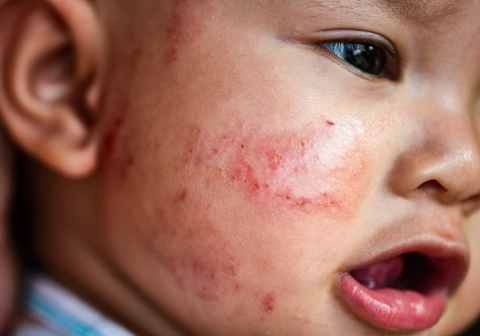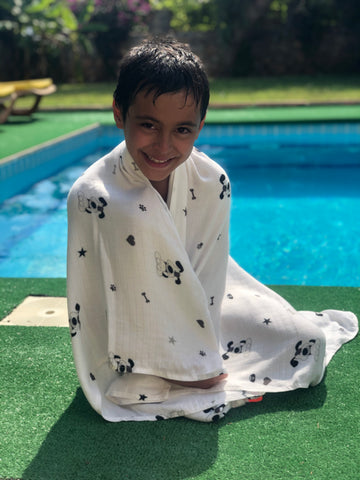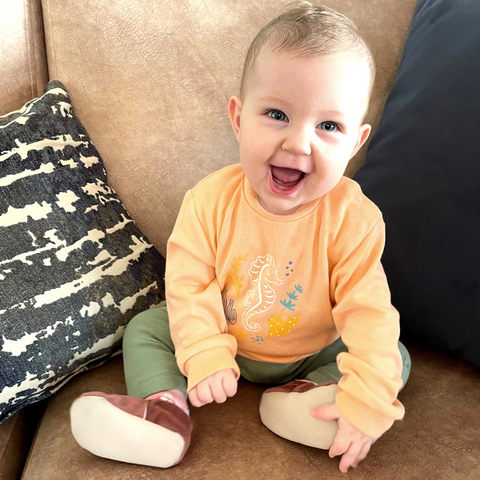What is eczema?
Bathing a baby with eczema requires a delicate balance of cleansing and moisturising to soothe irritated skin and prevent flare-ups.
While bathing is an important part of managing eczema, it's essential to use gentle, hydrating products and follow proper bathing techniques to protect your baby's delicate skin.
In this blog, we'll explore tips and strategies for bathing a baby with eczema, helping parents provide relief and comfort for their little ones.
1) Choose the Right Bathing Products
- Opt for mild, fragrance-free cleansers specifically formulated for sensitive skin. Look for products labeled as hypoallergenic and free of harsh chemicals, dyes, and preservatives.
- Consider using oatmeal-based bath products, which have natural soothing properties and can help relieve itching and inflammation.
They did not have many natural eczema creams in 2011 when Ethan badly suffered from it. However, nowadays there are so many natural remedies you can find over the counter.
Alternative Treatments for Eczema
Prior to initiating any treatment, it's essential to identify the triggers of your eczema. Understanding the irritants present in your environment can enhance your ability to effectively manage the condition, whether you opt for conventional medications, alternative therapies, or a combination of both.
The following complementary and alternative therapies have undergone studies and have been observed to alleviate specific symptoms of eczema in adults. If you're considering alternative therapies for your child's eczema, consult with your healthcare provider for guidance.
- Coconut Oil
- Sunflower Oil
- Topical Vitamin B12
- Vitamins 7 Supplements such as Vitamin D, Fish Oil, Zinc, Selenium, Probiotics, Turmeric & Primrose Oil

2) Bathe in Lukewarm Water
- Avoid hot baths, as hot water can further dry out and irritate sensitive skin. Instead, opt for lukewarm water, which is gentle and less likely to exacerbate eczema symptoms.
- Limit bath time to no more than 10 minutes to prevent over-drying the skin. Shorter, more frequent baths are preferable for babies with eczema.
3) Pat, Don't Rub, Dry
- After bathing, gently pat your baby's skin dry with a soft towel. Avoid rubbing, as friction can aggravate eczema and cause further irritation.
- Leave a thin layer of moisture on the skin and apply moisturiser immediately after bathing to lock in hydration and prevent moisture loss.
We have found it very useful to use the Bebekish Muslin Swaddle for Ethan after bath because it is made from 100% natural bamboo and is incredibly soft. Ethan enjoys bath time even more with it.
When he got older, we start using it after the swimming pool. Great! ⭐️

4) Moisturise Regularly
- Moisturising is key to managing eczema and keeping the skin hydrated. Choose a thick, fragrance-free moisturiser or emollient cream and apply it liberally to your baby's skin at least twice a day.
- Pay extra attention to areas prone to eczema flare-ups, such as the elbows, knees, hands, and face. Keep a travel-size moisturiser on hand for on-the-go touch-ups.
5) Use Soft, Breathable Fabrics
- Dress your baby in soft, breathable fabrics like cotton or bamboo to minimise irritation and allow the skin to breathe. Avoid rough or scratchy materials, as they can aggravate eczema symptoms.
As we've navigated our journey with eczema, we understand the importance of comfort for your little one. That's why we've crafted super soft, organic, and natural baby clothing, designed to keep your baby cozy all day long.
Explore our Organic Baby Clothing section for a range of essentials, including bodysuits, sleepsuits, joggers, sweatshirts, and dungarees. Experience the difference with Bebekish Clothing—gentle on sensitive skin, and perfect for everyday wear.

6) Keep Nails Short and Smooth
- Trim your baby's nails regularly to prevent scratching, which can damage the skin and lead to infections. Keep nails short and smooth to minimise the risk of injury during eczema flare-ups.
7) Consult a Paediatrician or Dermatologist
- If your baby's eczema symptoms persist or worsen despite proper bathing and skincare, consult a pediatrician or dermatologist for further evaluation and treatment options. They can provide personalised recommendations and prescribe medicated creams or ointments if necessary.
Bathing a baby with eczema requires patience, gentleness, and careful attention to skincare. By following these tips and incorporating them into your baby's bathing routine, you can help soothe irritated skin, prevent flare-ups, and provide relief for your little one's eczema symptoms.
Remember to be consistent with your skincare regimen and consult a healthcare professional if you have any concerns or questions about managing your baby's eczema.
With proper care and attention, you can help your baby feel comfortable and happy in their own skin.











